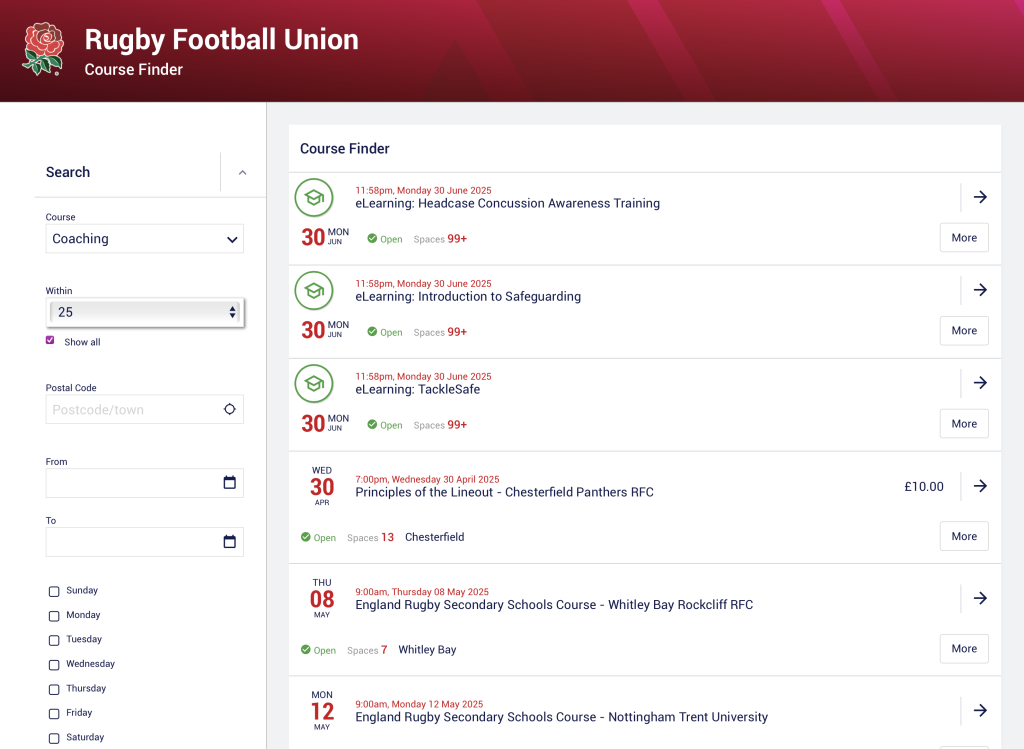Volunteers Are The Backbone of Rugby
Rugby thrives because of passionate volunteers—club officials, coordinators, event helpers, administrators, and more. Eastern Counties Rugby Union supports clubs in recruiting, retaining, and recognising volunteers who help keep the sport alive and growing across our communities.
I want to see information for...
Why Volunteer in Rugby?
Volunteering with rugby clubs or with ECRU offers more than just match-day involvement. It's an opportunity to grow, connect, and make a real impact on your community.
Volunteer Benefits
Develop new skills
Build qualities
Meet new people
Enhance your CV or profile
Improve health & wellbeing
Make a lasting difference
Availiable Roles
ECRU & clubs offer a range of volunteer roles, including but not limited to:
Club Volunteer Coordinator (CVC)
Chair of Playing Committee
Women & Girls Lead
Representative Rugby Manager
Events & Festival Volunteers
Diversity & Inclusion Lead
Safeguarding Officer
Fixture Secretary
What to Expect
No previous experience needed
Flexible commitments
Supportive club environment
Getting Started
Identify Your Interests
Express Interest
Onboarding & Support
Recognition & Development
Who & How to Get in Touch
If you would like to become a volunteer for the ECRU/your local club, want to ask any questions, or aren't too sure where to start - contact one of our Volunteer Coordinators and they'll help guide you through the process.
EC Volunteer Coordinator
Norfolk Volunteer Coordinator
Cambridgeshire Volunteer Coordinator
We will ensure your details are given to the right people
Recruitment, Roles, Retention & Recognition
Recruitment
Finding Volunteers
Recruitment is key for all clubs - The best and easiest way is simply to talk to people, whilst some may not know you need help, others may not put themselves forward but may respond if asked.
How about a club open day in advance of your AGM
Helpful Links
The below links give you some advice and guidance on some good ways to recruit volunteers.
Role Descriptions
Presenting Clear, Enjoyable Roles
When recruiting volunteers you need to remember that volunteering is a choice and that people volunteer for many different reasons.
Enjoy what they do
Use Rugby`s core values
How Role Descriptions Help Recruit Volunteers...
When recruiting volunteers you need to be very clear about the role they are taking on.
The role description shouldn't be very long and shouldn't read like a JOB description, Remember - people's time is limited, even those that are retired!
Templates For
Role Descriptions
When recruiting volunteers you need to remember that volunteering is a choice and that people volunteer for many different reasons.
Retention & Recognition
Appreciation Keeps Volunteers
It’s about more than recruiting: keeping volunteers motivated is key.
ECRU helps clubs with effective retention strategies—simple gestures like “thank-you” messages, volunteer awards, and signposting volunteers to RFU or external recognition schemes.
Why Have a VC?
Recruiting volunteers is crucial to running a strong and healthy rugby club, The majority of clubs wouldn't survive without volunteers and wouldn't thrive without quality volunteers.
The key to recruiting, retaining, recognising and rewarding volunteers is to have the best possible Club Volunteer Coordinator.
What is a Club Volunteer Coordinator?
A CVC is someone who should be first point of contact for potential and current volunteers in a club, It’s a very sociable role, always around the club, pro-actively supporting, asking questions and being the eyes and ears for all volunteer matters for the club Committee.
Don't overload your Club Volunteer Coordinator
Bring CVC onto the main committee
Start Recruiting
Recruiting volunteers is crucial to running a strong and healthy rugby club, The majority of clubs wouldn't survive without volunteers and wouldn't thrive without quality volunteers.
Appoint a CVC
Identify your needs
Leverage ECRU support
Get In Touch
Eastern Counties also offers specific support to clubs around volunteering through our Volunteer Coordinator.
EC Volunteer Coordinator
- He can support clubs in the writing of role descriptions and recruitment techniques.
- He can visit clubs and support specific issues at clubs.

